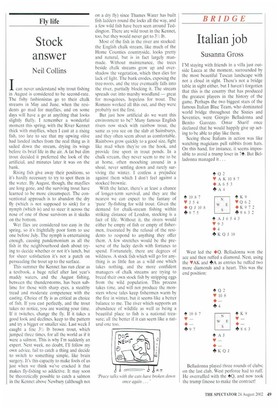Stock answer
Neil Collins
Ican never understand why trout fishing in August is considered to be second-rate. The fishy fashionistas go to their chalk streams in May and June, when the residents go mad for mayflies, and on some days will have a go at anything that looks slightly fluffy. I remember a wonderful moment this spring, with the River Kennet thick with mayflies, when I cast at a rising fish, too late to see that my upwing olive had landed inches from the real thing as it sailed down the stream, drying its wings before its brief life in the air, A fat but dim trout decided it preferred the look of the artificial, and minutes later it was on the bank.
Rising fish give away their positions, so it's hardly necessary to try to spot them in the water. By August, though, the mayflies are long gone, and the surviving trout have learned to be more circumspect. The conventional approach is to abandon the dry fly (which is not supposed to sink) for a nymph (which is) and to steer it across the nose of one of those survivors as it skulks on the bottom.
Wet flies are considered too easy in the spring, so its frightfully poor form to use one before July. The nymph is entertaining enough, causing pandemonium as all the fish in the neighbourhood dash about trying to decide whether or not it's lunch, but for sheer satisfaction it's not a patch on persuading the trout up to the surface.
This summer the Kennet has run clear as a textbook, a huge relief after last year's muddy waters, and the August fishing, between the thunderstorms, has been sublime for those with sharp eyes, a stealthy tread and moderate competence with the casting. Choice of fly is as critical as choice of fish. If you cast perfectly, and the trout takes no notice, you are wasting your time, If it twitches, change the fly. If it takes a good look and declines, keep to the pattern and try a bigger or smaller size. Last week I caught a fine 3V: lb brown trout, which jumped three times, for all the world as if it were a salmon. This is why I'm suddenly an expert. Next week, no doubt, I'll follow my own advice, fail to catch a thing and decide to switch to something simple, like brain surgery. It's this capacity to make fools of us just when we think we've cracked it that makes fly-fishing so addictive. It may soon be theoretically possible to catch a salmon in the Kennet above Newbury (although not on a dry fly) since Thames Water has built fish ladders round the locks all the way, and a few wild fish have been seen around Teddington. There are wild trout in the Kennet, too, but they would never get to 3'/2 lb.
Most of the fish in the river are stocked: the English chalk stream, like much of the Home Counties countryside, looks pretty and natural, but is in fact largely manmade. Without maintenance, the trees beside chalk streams grow up and overshadow the vegetation, which then dies for lack of light. The bank erodes, exposing the tree-roots, and the tree eventually falls into the river, partially blocking it. The stream spreads out into marshy woodland — great for mosquitoes, hopeless for trout. The Romans worked all this out, and they were probably not the first.
But just how artificial do we want this environment to be? Many famous English rivers now stock with rainbow trout, the same as you see on the slab at Sairisbmys, and they often seem about as comfortable. Rainbows grow quickly to a good size, fight like mad when they're on the hook, and provide fine sport in trout ponds. In a chalk stream, they never seem to me to be at home, often mooching around in a shoal, never settling down and rarely surviving the winter. I confess a prejudice against them which I don't feel against a stocked brownie.
With the latter, there's at least a chance of longer-term survival, and they are the nearest we can expect to the fantasy of 'pure' fly-fishing for wild trout. Given the demand for chalk-stream fishing within striking distance of London, stocking is a fact of life. Without it, the rivers would either he empty of fish or empty of fishermen, frustrated by the refusal of the residents to respond to anything they offer them. A few stretches would be the preserve of the lucky devils with fortunes to spend. Fortunately, there are degrees of wildness. A stock fish which will go for anything is as little fun as a wild one which takes nothing, and the more confident managers of chalk streams are trying to breed their own stock fish by stripping eggs from the wild population. This process takes time, and will not produce the monsters whose tales keep fishermen warm by the fire in winter, but it seems like a better balance to me. The river which supports an abundance of wildlife as well as being a beautiful place to fish is a national treasure; all the better if it can seem like a natural one too.






























































 Previous page
Previous page